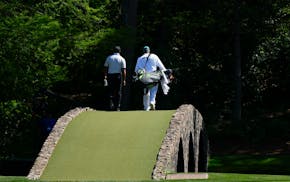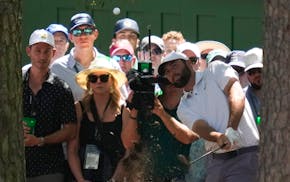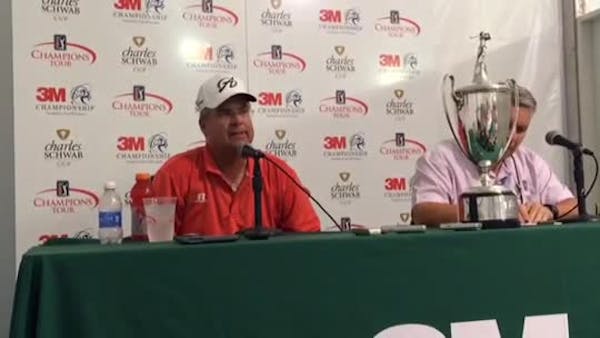Going home. The phrase makes for a sweet song, a great story, but sometimes going home is more complicated than a lyric.
Sunday at the TPC Twin Cities, Kenny Perry held off Bernhard Langer with a birdie putt on the 18th hole to win the 3M Championship. The victory meant another big check for a relentless money winner, yet another trophy for a guy who has at times dominated the Champions Tour.
It also might represent the most disposable victory of his career, because he admitted this was a "warm-up." By the time his last putt fell, he had to be thinking about the upcoming week, and going home.
Thanks to an exemption granted by the PGA of America, Perry will play in the PGA Championship this week at Valhalla, in his home state of Kentucky. "The PGA of America gave me a gift I can't give back," he said.
The tour doesn't often visit Kentucky, and yet it is at Valhalla that Perry, in all of his years of competitive golf, produced his two most vivid golfing memories.
In 1996, he took a one-shot lead into the 72nd hole at the PGA Championship, and made a bogey, then lost to Mark Brooks in a playoff. Perry would become one of the most accomplished American players of recent vintage to not win a major. "Kentucky remembered me for that," Perry said. "And that was difficult."
In 2008, he played on the American Ryder Cup team and won what might have been the key singles match on Sunday, beating Henrik Stenson, then hugging his father, who walked onto the green wearing bib overalls. "He had a few cigars in his shirt, too," Perry said. "He survived the Battle of the Bulge. He's my hero."
Perry returns to Valhalla this week knowing he will be paired with Stenson in the first two rounds, and that he will turn 54 on Sunday, and that his father and the rest of his family will be outside the ropes, and that this will be his last chance to play on a grand stage in his home state. "What a way to go out," he said.
Maybe his final-round performance in Blaine indicates he has learned how to make an exit. Perry held a four-shot lead at one point in the final round, and when his playing partners, Marco Dawson and Gary Hallberg, faltered, he relaxed.
The TPC does not feature many leaderboards. "I figured it was over," Perry said.
He made his sixth birdie of the day on the 12th hole. He proceeded to make five straight pars. He kept hitting fairways and greens … and missing birdie putts.
He finally spotted a leaderboard on the 17th hole. "When I saw Bernhard at 22 under," he said, "I about flipped out."
Perry made par on the 17th. Langer, playing one group ahead of Perry, only managed par the par-5 18th.
Perry pulled his driver slightly to the left, leaving him with a longer approach than he wanted. At 235, and between clubs, he aimed at the large grandstand behind the green and pounded a shot right at it. "I wanted to bank one off the green monster," he said.
Instead, the ball slipped under the stands. Perry took a free drop, flopped a wedge shot to within 15 feet, then made a 15-foot uphill putt that mimicked his ball flight, sweeping from right to left.
"I haven't made many putts on the 18th to win tournaments," he said.
Perry is the rare accomplished golfer who brings up his own flaws, his own failures. He's so likable and charitable that, in 2002, golf writers gave him the Charles Bartlett Award, given for "unselfish contributions to the betterment of society." In 2009, he won the Payne Stewart Award, given for sportsmanship and good works.
He won't win the PGA, and he knows this will be his last major. He wants to cut back on golf to enjoy his grandchildren. "I just want to go back and tell everybody thank you for my 30 years," he said.
For Perry, going home this week means embracing bad memories and good, and hoping he gets to celebrate his birthday with another hug from his dad on a course lined with bluegrass rough.
Jim Souhan can be heard weekdays at noon and Sundays from 10 to noon on 1500 ESPN. @SouhanStrib • jsouhan@startribune.com

Souhan: Why Tiger Woods should keep swinging
Souhan: Scheffler wins Masters again, shows what makes him special
Morikawa falters in final round at Masters

Keeping up with the Joneses who helped design Augusta National's classic back nine


